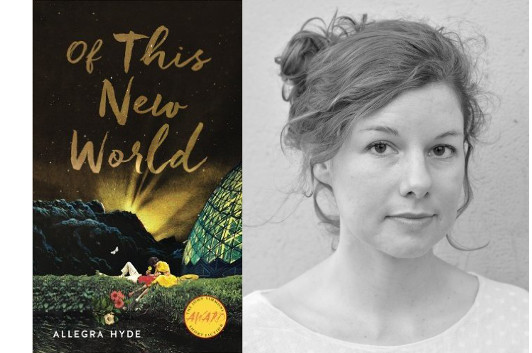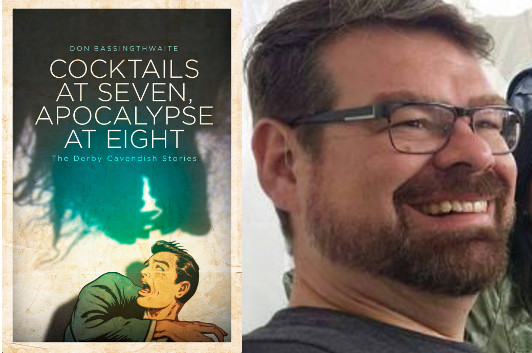Allegra Hyde: The Beautiful Messiness of Deb Olin Unferth’s “Pet”

photo: Molly O’Keefe
I was delighted to learn that Allegra Hyde is a fan of Deb Olin Unferth, whom I’ve admired for years. And as I’ve been reading the stories in Hyde’s John Simmons Award-winning debut collection, Of This New World, I’m becoming a big fan of hers as well. Her stories have a strong knack for getting into the heads of emotional outcasts, like the teenage girl who’s extracted from her parents’ commune and sent to live with her grandmother in “Free Love” or the severely injured Iraq War vet obsessing over his twin brother’s encounter with his ex-girlfriend halfway around the world in “VFW Post 1492.” Like the Biblical Eve, who’s given a new voice in “After the Beginning,” Hyde’s characters have often jolted out of what should be a happy world, or walking in it but not quite able to make themselves of it, no matter how hard they strive.
I have owned many pets over the course of my life: a pet cat, a pet tree frog, a pet rock, pet Sea-Monkeys®. To quote George Eliot, “Animals are such agreeable friends—they ask no questions, they pass no criticism.” However, though our pets may ask no questions or criticize (at least most of them), they still reveal things about us in the way we interact with them.
Deb Olin Unferth knows this and uses it to great effect in “Pet,” which was originally published in Noon and later selected for the 35th Pushcart Prize collection. Among the many short story writers I admire, Unferth stands out for her ability to elegantly fuse scenes of daily existence with both humor and poignancy. In “Pet,” a woman’s son adopts a pair of turtles. The turtles must be cared for—which turns out to be rather strenuous. The ensuing turtle drama reveals the story’s deeper concern: the woman’s relationship with her son. Both narrative threads work in tandem, with the turtle problems speaking metaphorically to a struggling mother’s parenting efforts.
These two threads are conspicuously bridged in a climactic scene toward the end of the story. Here’s a passage from that scene that shows the stream of consciousness feeling to Unferth’s writing style, swaying and bending with the emotional movement of the protagonist:
So she goes and buys some drain cleaner, the really powerful stuff. She pours it in and waits (You didn’t mention the man, says her son, didn’t say a word. Well, she does have other concerns on her mind right now) and the drain explodes. Turtle feces all over the tub and wall and the curtain and the window because that is the kind of place she lives in with her only son, a basement apartment with cheap drains in a bad neighborhood because her husband divorced her and left, even through she stopped drinking, and he never calls his son, not even on his birthday, never sends enough money, and there is turtle shit on the wall and she has to be up early, and meanwhile years are going by, her son growing up and she fading further from his mind.
28 December 2016 | selling shorts |
Don Bassingthwaite: Lovecraft Meets Maupin for the Holidays

photo courtesy ChiZine Publications
The stories in Don Bassingthwaite‘s Cocktails at Seven, Apocalypse at Eight are a hilariously campy addition to the tradition of supernatural stories for the holidays. It’s not just ghosts, although there is a ghost with a particularly Saturnalian thirst. Derby Cavendish, Bassingthwaite’s occult specialist, also comes across Krampus, a minotaur, a werewolf who’s also a drag queen, and a otherworldly spirit who manifests in the form of hideous Christmas sweaters. In this guest essay, Bassingthwaite explains how a Lovecraft pastiche that wasn’t quite working got boosted to a whole new level thanks to Tales of the City. Does that sound like a bit much? Well, as he says, “Stay with me on this because it works out.”
The very first incarnation of Derby Cavendish was in a story that I wrote nearly twenty years ago for submission to Strange Tales magazine. “Derby Cavendish and the Thing in the Cellar” was a gay pastiche of a Lovecraft story. It hit almost every Lovecraftian trope—Esoteric allusions! Eerie settings! Warped space-time! Squamous tentacles!—as it followed a dauntless and witty hero facing an Ancient Evil lurking in the basement of a gay bar.
I loved it. Strange Tales did not.
In hindsight, I can understand why. The Lovecraft influences were too strong, too blatant, too—in a word—sprawling. “The Thing in the Cellar” clocked in at almost 10,000 words. It was not a good story and, no, it’s not in Cocktails at Seven. But Derby was a good character. He was smart and confident. He didn’t let anything get in his way. He was magical in a world of secret magic and he was fearlessly flamboyant. He may have grown out of Lovecraft but he needed a better, more vibrant story—and story structure—than a Lovecraft pastiche could provide.
Which is where Armistead Maupin comes in.
If you’re not familiar with the Tales of the City books, they’re a slice of San Francisco life, written and set (at first) in the late 1970s and early ’80s. They’re full of wonderful characters both gay and straight interacting on a personal level and with larger events. They feel real, yet at the same time dramatic and thrilling. More importantly for my Derby Cavendish stories, Tales of the City started as a serial in the San Francisco Chronicle, each installment short and spare but captivating.
I adore Maupin’s magnificent stories and his amazing short form storytelling. His books are also the opposite of Lovecraft in almost every way: light and airy instead of dark and gothic, sparse instead of overblown, and focused on character rather than setting, with allusions that come across more like gossip than the arcana of lost ages. And, of course, they’re gloriously gay.
In 2010, when I was invited by the organizers of the Chiaroscuro Reading Series here in Toronto to read at their inaugural Very Special Christmas Special, I knew immediately that I wanted to revisit Derby Cavendish. The brief for the evening was to read something funny—and short. H.P. Lovecraft had already made a mark on Derby Cavendish, but as I wrote the my new story, I also kept Tales of the City in mind. Short. Fast-paced. Airy. Full of character. Gossipy. Gay I had covered.
The story from that first Christmas special was “Fruitcake,” the lead story in Cocktails at Seven, Apocalypse at Eight, and it was a hit. I’ve been reading a Derby Cavendish story at the Chiaroscuro Series holiday special every year since. I know they wouldn’t have been the same without the dual influence of H.P. Lovecraft and Armistead Maupin. I don’t imagine Lovecraft would be very impressed by them, but I like to think Maupin might.
24 December 2016 | selling shorts |

 Our Endless and Proper Work is my new book with Belt Publishing about starting (and sticking to) a productive writing practice.
Our Endless and Proper Work is my new book with Belt Publishing about starting (and sticking to) a productive writing practice. 
